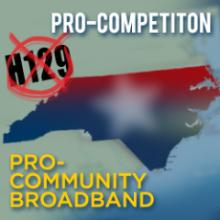Raleigh Resolution Against Time Warner Monopoly Protection Act
A resolution opposing H129/S87 from the city of Raleigh:
RESOLUTION NO. 2011 – 322
A RESOLUTION OF THE CITY OF RALEIGH URGING THE STATE TO RECOGNIZE THE ROLE OF MUNICIPALITIES IN THE DEPLOYMENT OF TECHNOLOGY SERVICES FOR THE ECONOMIC DEVELOPMENT OF NORTH CAROLINA AND TO EXPRESS CONCERN ABOUT POTENTIAL LEGISLATION TO LIMIT LOCAL GOVERNMENT PROVISION OF BROADBAND SERVICE
Whereas, access to high capacity, high-speed, state-of-the-art broadband networks is essential for our state to compete in the global economy and to provide citizens access to advanced applications in medicine, public safety, energy management and education;
Whereas, the United States is rapidly losing ground to other countries in broadband subscriptions per capita and North Carolina is similarly losing ground to other states;
Whereas, contrary to that trend, the City of Raleigh has made significant strides in ensuring that businesses, citizens, and visitors have access to technology services, providing free WiFi service in the center city area;
Whereas, in March of 2010 the City of Raleigh was named America's Most Wired City by Forbes, ranking higher overall than any other U.S. city in three measures—broadband penetration, broadband access, and plentiful WiFi hot spots;
Whereas, the City of Raleigh's experience demonstrates the economic development benefits of investment in the deployment of advanced networks by public and private providers;
Whereas, Senate Bill 87 and House Bill 129, companion bills entitled Level Playing Field/Local Gov't Competition, were introduced in the 2011 Regular Session of the North Carolina General Assembly; and
Whereas, if enacted the proposed legislation would not have leveled the playing field but instead would have hindered local governments from providing needed communications services, especially advanced high-speed broadband, in underserved areas and imposed burdensome obligations on local governments that private broadband providers would not have to meet;
Whereas, if enacted the proposed legislation would have denied local governments the availability of federal grants under the American Recovery and Reinvestment Act to assist in providing affordable access to high capacity broadband service in unserved and underserved areas; and



